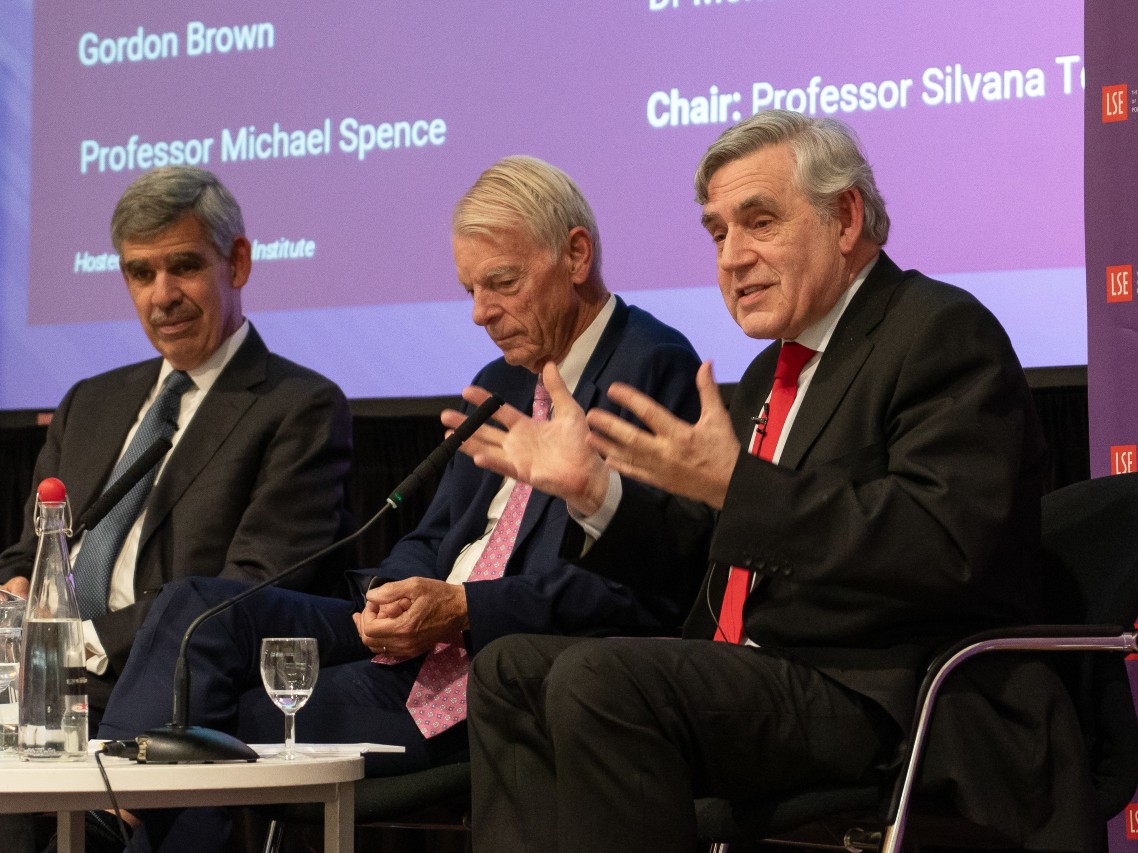 Dr Mohamed A. El-Erian, Professor Michael Spence and Gordon Brown (left to right)
Dr Mohamed A. El-Erian, Professor Michael Spence and Gordon Brown (left to right)
Gordon Brown, former Prime Minister of the United Kingdom, visited LSE last week in an event hosted by the LSE European Institute and chaired by Professor Silvana Tenreyo.
Brown discussed his new book ‘Permacrisis: a plan to fix a fractured world’, alongside co-authors Dr Mohamed A. El-Erian, Chief Economic Advisor at Allianz, and Professor Michael Spence, Emeritus Professor of Management at Stanford University.
Before introducing the book’s themes in more detail, Brown referred to LSE as always having been a “centre of new thinking, especially about the economy”.
He went on to highlight the three central concerns of the book amidst the world’s “interlocking crises”: the need for “a new theory for economic growth” that emphasises equity and the environment; “better and newer systems of national economic management that break free from the old Washington Consensus”; and “a new model for international cooperation”.
After applauding his co-authors’ achievements in economic thinking and the questions that motivated them to work on this book, Brown drew laughter from the audience when he quipped that he was a “recovering politician”.
Following the introduction, Professor Spence discussed the variety of new factors, from aging populations to geopolitical tensions, that have turned a demand-led economy into one where growth is constrained by supply, the risk of inflation is greater, and productivity is dropping.
He then shifted to the “technological and scientific transformations that are going to change the way economies work” – artificial intelligence, advancements in biomedical and life sciences, and the energy transition. He dubbed these transformations “powerful tools” to help boost productivity and the supply side of the economy, alongside public-sector involvement and a “positive policy agenda” when harnessing technology.
Next, Dr El-Erian recounted the pessimism and optimism that brought the authors together – concerns about the world future generations will inherit, as well as the “desirable and feasible” set of measures that could break global vicious cycles. He went on to examine national economic management of recent decades, terming it “winning the war but losing the peace”; policymaking has been reactive to crises but has failed to prevent them and to improve financial resilience in their aftermath.
Dr El-Erian then illustrated the authors’ “best practice” solutions to the short-term political thinking that has come at the cost of trust in institutions and longer-term wellbeing, using a detailed case study of the Federal Reserve’s mistakes regarding inflation.
Brown continued this theme by describing individual countries’ and politicians’ “blind spots” and the necessity of coordinated action in a multipolar world. He also discussed the global context of the ‘permacrisis’ further, concluding with the need for “a system of burden-sharing” and “multilateral and multinational institutions”.
“The real battle in this world is not between one two countries, the real battle is against poverty, squalor, pollution, inequality, injustice, and we have to fight that battle together.”
The event concluded with an interactive audience Q&A, which introduced further areas of discussion including public appetite for institutional change and where global leadership might come from. Brown ended by emphasising that to solve the ‘permacrisis’, “we have to retain hope”.